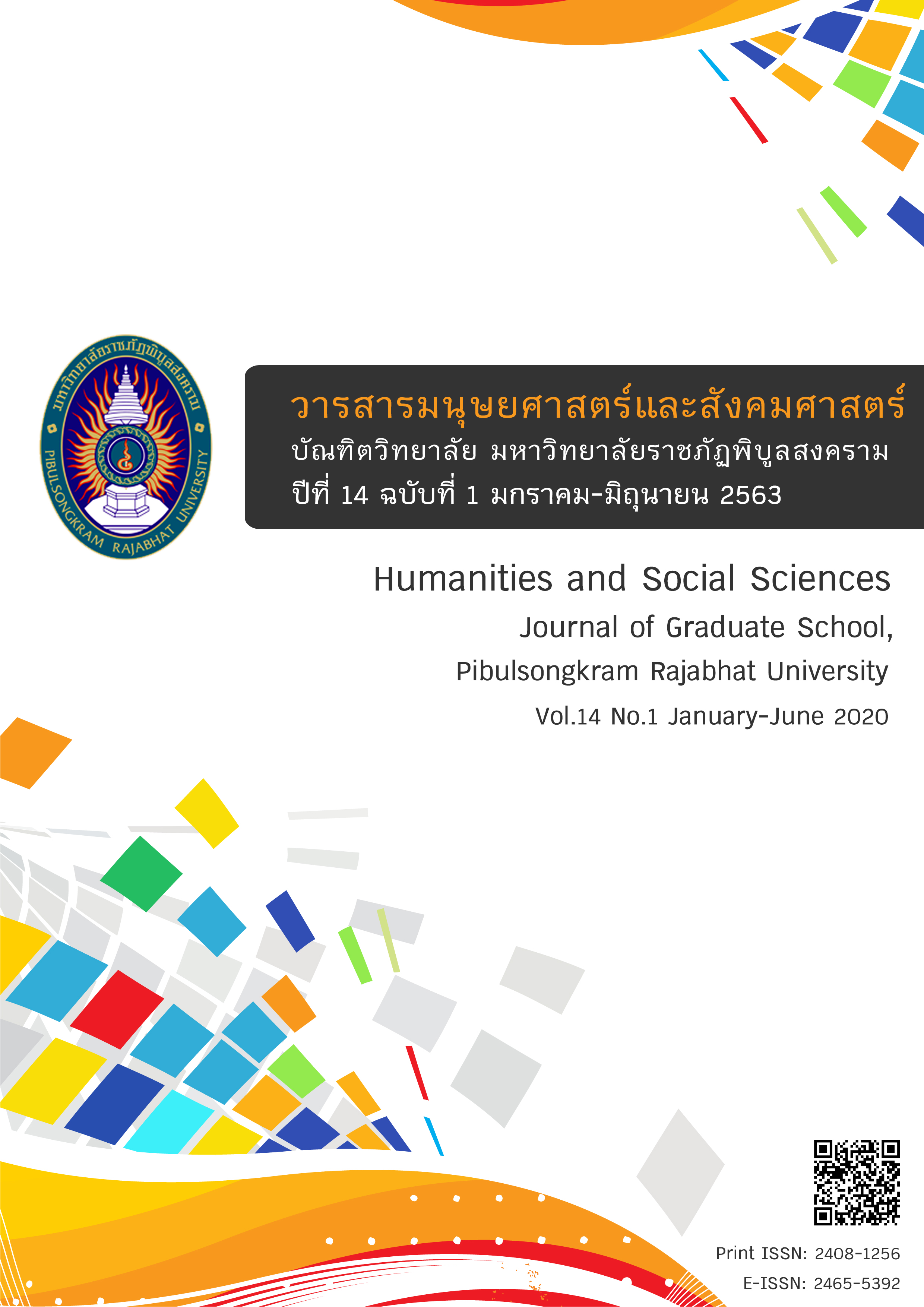Effects of the Organizational Commitment and Job Motivation as Mediated Variables Between Perceived Organizational Support and Job Performance of Petrol Station Staff Located at Om Yai Branch, Sampran, Nakhon Pathom Province
Keywords:
Perceived Organization Support, Organizational Commitment, Job Motivation, Job PerformanceAbstract
This study aimed to investigate: (1) levels of perceived organizational support, organizational commitment, job motivation, and job performance; (2) organizational commitment as a mediated variable between perceived organizational support and job performance; and (3) job motivation as a mediated variable between perceived organizational support and job performance of the petrol station staff located at Om Yai branch in Sampran, Nakhon Pathom province. Samples in this study were 100 petrol station staff at Om Yai branch in Sampran, Nakhon Pathom province. A research instrument used in this study was a questionnaire, statistically analyzed by percentage, means, standard deviation, and structural equation model (SEM) analysis. Results in the study showed that: (1) levels of perceived organizational support, organizational commitment, job motivation, and job performance of Petrol station staff located in Om Yai branch in Sampran, Nakhon Pathom province were overall averaged at a high level, ranging at 3.62, 3.99, 3.91, and 3.73 respectively; whereas, the standard deviation of these aforementioned variables were averaged at 0.817, 0.741, 0.721, and 0.764 respectively; (2) the coefficient scales of Boot LLCI of the organizational commitment as a mediated variables of perceived organizational support and job performance were at 0.245 and the coefficient scales of Boot ULCI were at 0.588; and (3) the coefficient scales of Boot LLCI of the job motivation as a mediated variable of perceived organizational support and job performance of petrol station staff located in Om Yai branch in Sampran, Nakhon Pathom province were at 0.329 and the coefficient scales of Boot ULCI were at 0.705. Thus, this study ascertained that the perceived organizational support of the systematic organization could promote organizational commitment. Meanwhile, the organizational commitment could contribute positive attitude and job motivation at work that could promote advantages and increase staff’s job performance further.
References
กระทรวงพลังงาน. (2562). สถานการณ์การใช้น้ำมันและไฟฟ้า. สืบค้น 20 ตุลาคม 2562, จาก https://is.gd/pgCIqa.
กวิตา พร้อมเพราะ. (2559). อิทธิพลของการรับรู้การสนับสนุนจากองค์การต่อเจตนาในการประหยัดพลังงานในสถานที่ทำงาน : การศึกษาตัวแปรส่งผ่านของความกระปรี้กระเปร่าในงานและความกตัญญู (วิทยานิพนธ์ศิลปศาสตรมหาบัณฑิต). จุฬาลงกรณ์มหาวิทยาลัย, กรุงเทพฯ.
เกศณรินทร์ งามเลิศ. (2559). แรงจูงใจที่มีผลต่อประสิทธิภาพในการปฏิบัติงานของพนักงานและลูกจ้าง องค์การคลังสินค้า (การค้นคว้าอิสระบริหารธุรกิจมหาบัณฑิต). มหาวิทยาลัยกรุงเทพ, ปทุมธานี.
ธัญนันท์ บุญอยู่. (2562). อิทธิพลของความไว้วางใจและการแบ่งปันความรู้ในฐานะปัจจัยคั่นกลางแบบอนุกรม ที่เชื่อมโยงความสัมพันธ์ระหว่างทุนทางจิตวิทยาสู่ผลการปฏิบัติงานของพนักงานวิสาหกิจขนาดย่อมของอุตสาหกรรมผลิตเซรามิก ในเขตกรุงเทพมหานครและปริมณฑล. วารสารสมาคมนักวิจัย, 24(1), 175-186.
ปรทิพย์ พันธุ์มณี. (2555). สมรรถนะการเห็นคุณค่าในตนเองที่มีพื้นฐานจากองค์การและผลการปฏิบัติงานของพนักงานระดับปฏิบัติการบริษัทสื่อสารโทรคมนาคมแห่งหนึ่ง (วิทยานิพนธ์วิทยาศาสตรมหาบัณฑิต). มหาวิทยาลัยเกษตรศาสตร์, กรุงเทพฯ.
ปัญญาพร ฐิติพงศ์. (2558). แรงจูงใจที่ส่งผลต่อประสิทธิภาพการปฏิบัติงานของบุคลากรในบริษัทก่อสร้าง: กรณีศึกษา บริษัท อินเตอร์ เอ็กซ์เพิร์ท คอนสตรัคชั่น จำกัด (วิทยานิพนธ์บริหารธุรกิจมหาบัณฑิต). มหาวิทยาลัยศิลปากร, กรุงเทพฯ.
ปัทมา ขันโท. (2559). การรับรู้การสนับสนุนจากองค์การ ความพึงพอใจในงาน และความผูกพันต่อองค์การของพนักงานบริษัท ทิสโก้ไฟแนนเชียลกรุ๊ป จำกัด (มหาชน) และบริษัทในเครือ (การค้นคว้าอิสระบริหารธุรกิจมหาบัณฑิต). มหาวิทยาลัยเทคโนโลยีราชมงคลรัตนโกสินทร์, นครปฐม.
มนตรี พิริยะกุล. (2553). ตัวแบบเส้นทางกำลังสองน้อยที่สุดบางส่วน. กรุงเทพฯ: มหาวิทยาลัยรามคำแหง.
วรรณา เจตนเสน. (2557). แรงจูงใจในการทำงานความพึงพอใจที่มีต่อสวัสดิการและผลการปฏิบัติงานของพนักงานมหาวิทยาลัยในกำกับของรัฐ (วิทยานิพนธ์ศิลปศาสตรมหาบัณฑิต). มหาวิทยาลัยเทคโนโลยีพระจอมเกล้าพระนครเหนือ, กรุงเทพฯ.
ศิริกัลยา สามไชย. (2559). แรงจูงใจในการทำงานภาวะผู้นำแบบเปลี่ยนแปลงและพฤติกรรมการเป็นสมาชิกที่ดีขององค์การ: กรณีศึกษาพนักงานบริษัทผลิตเครื่องมือแพทย์แห่งหนึ่ง (วิทยานิพนธ์ศิลปศาสตรมหาบัณฑิต). มหาวิทยาลัยธรรมศาสตร์, กรุงเทพฯ.
สถานีบริการน้ำมัน. (2562). สรุปข้อมูลจำนวนพนักงานประจำปี 2562. กรุงเทพฯ: สถานีบริการน้ำมันอ้อมใหญ่.
สมจิตร จันทร์เพ็ญ. (2557). ความผูกพันต่อองค์การของเจ้าหน้าที่สถาบันพัฒนาองค์กรชุมชน (องค์การมหาชน) (การค้นคว้าอิสระศิลปศาสตรมหาบัณฑิต). สถาบันบัณฑิตพัฒนบริหารศาสตร์, กรุงเทพฯ.
Boonyoo, T., Thanonthaweekul, P., & Boonmakerd, K. (2018). Influences of Trust and Work Values towards the Relationships Transferred between Psychological Capital and the Employees’ Performance of Small Enterprises in Thai Ceramic Industries. The 13th National and International Sripatum University Conference (SPUCON2018), 103-112.
Chobsa-ard, V., & Boonyoo, T. (2018). Serial mediated effects of motivation and work values in influencing self-esteem towards effectiveness of volunteers at saint peter’s church, Samphran, Nakhon Pathom. The 13th National and International Sripatum University Conference (SPUCON 2018), 260-268.
Elnaga, A., & Imran, A. (2013). The Effect of Training on Employee Performance. European Journal of Business and Management, 5(4), 137-147.
Gillet, N., Huart, I., Colombat, P., & Fouquereau, E. (2013). Perceived Organizational Support, Motivation, and Engagement among Police Officers. Professional Psychology: Research and Practice, 44(1), 46-55.
Guangyi, L., & Shanshan, Y. (2016). Psychological Capital: Origin, Connotation and the Related Factors. Canadian Social Science, 12(8), 71-77.
Kappagoda, S., Othman, H. Z. F., & Alwis, G. D. (2014). The Impact of Psychological Capital on Job Performance: Development of a Conceptual Framework. European Journal of Business and Management, 6(15), 143-154.
Likert, R. (1932). A Technique for Measurement of Attitudes. Archives of Psychology. 140, 5-55.
Nasurdin, A. M., Ling, T. C., & Khan, S. N. (2018). Linking Social Support, Work Engagement and Job Performance in Nursing. International Journal of Business and Society, 19(2), 363-386.
Rich, B. L., Lepine, J. A., & Crawford, E. R. (2010). Job Engagement: Antecedents and Effects on Job Performance. Academy of Management Journal, 53(3), 617-635.
Saltson, E., & Nsiah, S. (2015). The Mediating and Moderating Effects of Motivation in the Relationship between Perceived Organizational Support and Employee Job Performance. International Journal of Economics, Commerce and Management, 3(7), 654-667.
Suyanto, S. (2018). Competence and Discipline on Work Motivation and the Implication on Working Performance. European Research Studies Journal, 21(1), 570-587.
Tampu, D. L. I., & Cochina, I. (2015). Motivation & Employee performance. Management and Innovation for Competitive Advantage, 9, 812-821.
Downloads
Published
How to Cite
Issue
Section
License
Any articles or comments appearing in the Journal of Humanities and Social Sciences, Rajabhat Phibulsongkram University, are the intellectual property of the authors, and do not necessarily reflect the views of the editorial board. Published articles are copyrighted by the Journal of Humanities and Social Sciences, Rajabhat Phibulsongkram University.









